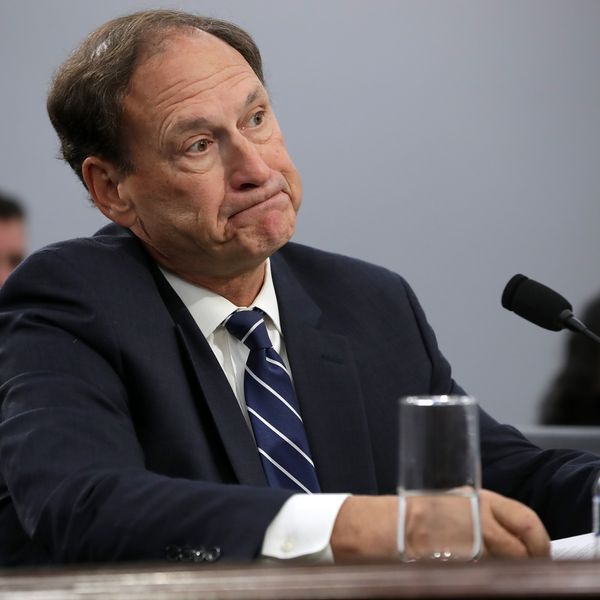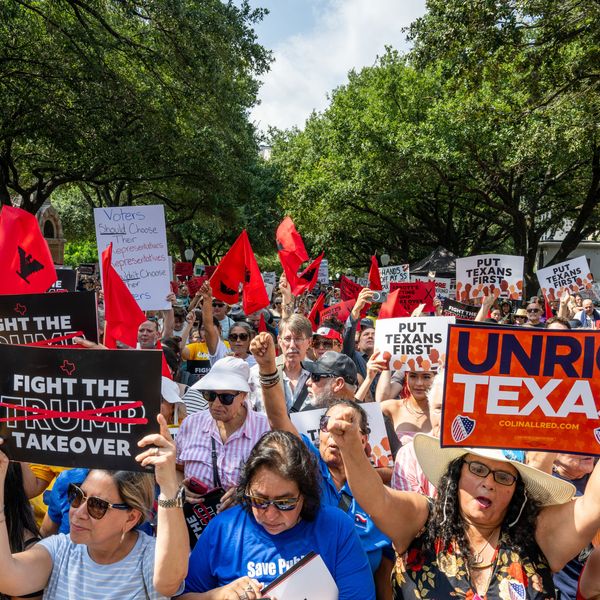Just Weeks Before Elections, Fed Judges Reinstate Texas's Harsh Voter ID Law
Rules upheld despite warnings from Department of Justice and a district judge that such laws suppress the Black and Hispanic vote
Just a few weeks before the November elections, a federal appeals court on Tuesday temporarily reinstated Texas's harsh voter ID law, despite warnings--including from the Department of Justice--that it suppresses people of color, the poor, the young, and the elderly from casting their ballots.
"Today's decision shocks the conscience of good people everywhere because it has the clear consequence of denying access to the ballot to many people of color, the elderly, and young persons," stated Gary Bledsoe, president of the Texas NAACP and an attorney with PotterBledsoe.
In the ruling, a three-judge panel on the New Orleans-based fifth circuit court of appeals temporarily blocked a decision issued last week to strike down voter ID requirements because they discriminate against Black and Hispanic voters.
As justification for Tuesday's reinstatement of the law, the panel argued that changing the requirements, so close to the election, could cause "confusion" among voters. "Based primarily on the extremely fast-approaching election date, we stay the district court's judgment pending appeal," Judge Edith Brown Clement wrote for the panel. The panel did not rule on the merit of the lower court's decision, instead imposing a temporary block to keep the requirements in place for the upcoming election.
In her decision last week, U.S. District Judge Nelva Gonzales Ramos compared the state's voter ID law to a poll tax, intentionally designed by the legislature to prevent minorities in the state from voting.
The Texas law, the strictest of its kind in the country, requires registered voters to show one of seven kinds of government-issued identification. Of the state's 13.6 million registered voters, more than 600,000 lack the required identification, most of them Black and Hispanic, according to the Department of Justice. But experts who have challenged the voter ID law in court say that, according to their estimates, 1.2 million eligible voters in the state lack the required identification, with Hispanic, Black, and low-income voters far less likely to meet the requirement.
The reinstatement of the rule hands a victory to the state's Republican Party, which is part of a growing, GOP-led effort to impose strict voter ID requirements across the country, in what critics warn amounts to the large-scale suppressing of voters of color.
Plaintiffs say they are filing an emergency appeal of Tuesday's decision to the Supreme Court.
"The Court of Appeals' decision is very unfortunate because it allows Texas to go forward with the most restrictive voter ID law in the country, which the district court found in a careful and detailed decision to have an unconstitutional racially discriminatory purpose," said Bob Kengle, co-director of the Voting Rights Project at the Lawyers' Committee for Civil Rights Under Law. "Minority voters in Texas should not have to go to the Supreme Court to vindicate their fundamental constitutional rights in this election."
An Urgent Message From Our Co-Founder
Dear Common Dreams reader, The U.S. is on a fast track to authoritarianism like nothing I've ever seen. Meanwhile, corporate news outlets are utterly capitulating to Trump, twisting their coverage to avoid drawing his ire while lining up to stuff cash in his pockets. That's why I believe that Common Dreams is doing the best and most consequential reporting that we've ever done. Our small but mighty team is a progressive reporting powerhouse, covering the news every day that the corporate media never will. Our mission has always been simple: To inform. To inspire. And to ignite change for the common good. Now here's the key piece that I want all our readers to understand: None of this would be possible without your financial support. That's not just some fundraising cliche. It's the absolute and literal truth. We don't accept corporate advertising and never will. We don't have a paywall because we don't think people should be blocked from critical news based on their ability to pay. Everything we do is funded by the donations of readers like you. Will you donate now to help power the nonprofit, independent reporting of Common Dreams? Thank you for being a vital member of our community. Together, we can keep independent journalism alive when it’s needed most. - Craig Brown, Co-founder |
Just a few weeks before the November elections, a federal appeals court on Tuesday temporarily reinstated Texas's harsh voter ID law, despite warnings--including from the Department of Justice--that it suppresses people of color, the poor, the young, and the elderly from casting their ballots.
"Today's decision shocks the conscience of good people everywhere because it has the clear consequence of denying access to the ballot to many people of color, the elderly, and young persons," stated Gary Bledsoe, president of the Texas NAACP and an attorney with PotterBledsoe.
In the ruling, a three-judge panel on the New Orleans-based fifth circuit court of appeals temporarily blocked a decision issued last week to strike down voter ID requirements because they discriminate against Black and Hispanic voters.
As justification for Tuesday's reinstatement of the law, the panel argued that changing the requirements, so close to the election, could cause "confusion" among voters. "Based primarily on the extremely fast-approaching election date, we stay the district court's judgment pending appeal," Judge Edith Brown Clement wrote for the panel. The panel did not rule on the merit of the lower court's decision, instead imposing a temporary block to keep the requirements in place for the upcoming election.
In her decision last week, U.S. District Judge Nelva Gonzales Ramos compared the state's voter ID law to a poll tax, intentionally designed by the legislature to prevent minorities in the state from voting.
The Texas law, the strictest of its kind in the country, requires registered voters to show one of seven kinds of government-issued identification. Of the state's 13.6 million registered voters, more than 600,000 lack the required identification, most of them Black and Hispanic, according to the Department of Justice. But experts who have challenged the voter ID law in court say that, according to their estimates, 1.2 million eligible voters in the state lack the required identification, with Hispanic, Black, and low-income voters far less likely to meet the requirement.
The reinstatement of the rule hands a victory to the state's Republican Party, which is part of a growing, GOP-led effort to impose strict voter ID requirements across the country, in what critics warn amounts to the large-scale suppressing of voters of color.
Plaintiffs say they are filing an emergency appeal of Tuesday's decision to the Supreme Court.
"The Court of Appeals' decision is very unfortunate because it allows Texas to go forward with the most restrictive voter ID law in the country, which the district court found in a careful and detailed decision to have an unconstitutional racially discriminatory purpose," said Bob Kengle, co-director of the Voting Rights Project at the Lawyers' Committee for Civil Rights Under Law. "Minority voters in Texas should not have to go to the Supreme Court to vindicate their fundamental constitutional rights in this election."
Just a few weeks before the November elections, a federal appeals court on Tuesday temporarily reinstated Texas's harsh voter ID law, despite warnings--including from the Department of Justice--that it suppresses people of color, the poor, the young, and the elderly from casting their ballots.
"Today's decision shocks the conscience of good people everywhere because it has the clear consequence of denying access to the ballot to many people of color, the elderly, and young persons," stated Gary Bledsoe, president of the Texas NAACP and an attorney with PotterBledsoe.
In the ruling, a three-judge panel on the New Orleans-based fifth circuit court of appeals temporarily blocked a decision issued last week to strike down voter ID requirements because they discriminate against Black and Hispanic voters.
As justification for Tuesday's reinstatement of the law, the panel argued that changing the requirements, so close to the election, could cause "confusion" among voters. "Based primarily on the extremely fast-approaching election date, we stay the district court's judgment pending appeal," Judge Edith Brown Clement wrote for the panel. The panel did not rule on the merit of the lower court's decision, instead imposing a temporary block to keep the requirements in place for the upcoming election.
In her decision last week, U.S. District Judge Nelva Gonzales Ramos compared the state's voter ID law to a poll tax, intentionally designed by the legislature to prevent minorities in the state from voting.
The Texas law, the strictest of its kind in the country, requires registered voters to show one of seven kinds of government-issued identification. Of the state's 13.6 million registered voters, more than 600,000 lack the required identification, most of them Black and Hispanic, according to the Department of Justice. But experts who have challenged the voter ID law in court say that, according to their estimates, 1.2 million eligible voters in the state lack the required identification, with Hispanic, Black, and low-income voters far less likely to meet the requirement.
The reinstatement of the rule hands a victory to the state's Republican Party, which is part of a growing, GOP-led effort to impose strict voter ID requirements across the country, in what critics warn amounts to the large-scale suppressing of voters of color.
Plaintiffs say they are filing an emergency appeal of Tuesday's decision to the Supreme Court.
"The Court of Appeals' decision is very unfortunate because it allows Texas to go forward with the most restrictive voter ID law in the country, which the district court found in a careful and detailed decision to have an unconstitutional racially discriminatory purpose," said Bob Kengle, co-director of the Voting Rights Project at the Lawyers' Committee for Civil Rights Under Law. "Minority voters in Texas should not have to go to the Supreme Court to vindicate their fundamental constitutional rights in this election."

